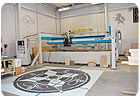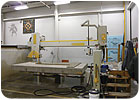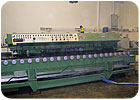
Photo courtesy of Jet Edge
Focusing on high-end custom commercial work, including waterjet fabrication, David Allen Company’s Fabrication Department operates out of a 4,300-square-foot fabricating facility in Raleigh, NC, which is equipped with a Model 55-75 waterjet from Jet Edge, Inc. of St. Michael, MN.
Focusing on high-end custom commercial work, including waterjet fabrication, David Allen Company’s Fabrication Department operates out of a 4,300-square-foot fabricating facility in Raleigh, NC, which is equipped with a Model 55-75 waterjet from Jet Edge, Inc. of St. Michael, MN.
In addition to serving as a commercial, industrial and institutional contractor, the David Allen Company also maintains a state-of-the-art fabrication facility at its corporate headquarters in Raleigh, NC. Among the stoneworking machinery in place, the 4,300-square-foot shop relies on waterjet technology from Jet Edge, Inc. of St. Michael, MN, for intricate work.
David Allen Company was founded in 1920 by David G. Allen, a mason who expanded the business to include marble, tile and terrazzo. In 1967, Robert Roberson became the owner of the company, and continued to grow the company to the point that a larger facility was needed. Today, the company has 400 employees overall, with branches in Virginia, Florida and North and South Carolina. The Fabrication Department was initially formed to produce the stone and tile work found in the company’s headquarters building today. And after the building was completed, the division began to do custom work for other companies and individuals, as well as supporting the work of the David Allen Company.
According to Fabrication Depart-ment Manager Paul Wilson, the company’s primary purpose is to support the commercial work of the other David Allen departments. “Among other things, we fabricate vanities, wall caps, stone bases, fireplace surrounds and window sills for commercial jobs,” he explained. “With the waterjet, we produce floor inlays and medallions in tile and stone and fabricate complete logos for terrazzo jobs. We also produce the small custom items that complement our large commercial work.”
A vast amount of the Fabrication Department’s work is for commercial projects, but the exposure from some larger projects brings in some residential work for the company as well. “We have established a network of customers over the years that uses us, but much of our new work comes in from referrals by other customers,” explained Wilson. “It is not uncommon for us to renovate a kitchen in a neighborhood and then end up renovating the kitchens of several of their neighbors.”

In 2001, the company purchased a GMM Techna 36 bridge saw. “It is a good, reliable bridge saw with a tilting table and 25-horsepower motor,” said Paul Wilson, Fabrication Department Manager. “It has some programmable functions. This is the workhorse of the shop.”
Equipping the shop
For fine-detailed projects, the company relies on a Model 55-75 waterjet from Jet Edge, Inc., which was purchased in 2001. “This is a fabulous machine,” said Wilson. “It is very reliable, has great technological support and allows us to do intricate work.”Additionally, the shop is equipped with a GMM Techna 36 bridge saw, which was also purchased in 2001. “It is a good, reliable bridge saw with a tilting table and a 25-horsepower motor,” said Wilson. “It has some programmable functions. This is the workhorse of the shop.”
The shop also houses a Bellani Comet line polisher, which was purchased in 2004. “This machine greatly speeds up kitchen fabrication,” said Wilson. Workers in the shop also rely on two Marmoelettromeccanica Master 3500 portable edging machines from Regent Stone Products of Virginia Beach, VA. “We purchased one in 2001 and the other in 2007,” said Wilson. “It is a very dependable router with a hydroplaning base that does not mar the finish of any stone.”
Recently, the company invested in Quick 6 hand polishers from Braxton-Bragg of Knoxville, TN, as they operate at a higher RPM than the polishers the company had previously been using. “These new polishers cost less and have increased production significantly,” said Wilson, adding that workers also rely on a vacuum lifter from Wood’s Powr-Grip Co., Inc. of Laurel, MT, to move slabs around the facility.
“We do not have a CNC machine, but we do have the waterjet, which is essentially a two-axis CNC cutting machine,” said Wilson. “When we started the Fabrication Department, no one had any experience with CNC machines or waterjet, so the first operator took several months to feel comfortable with the machine, and another year of experimenting, innovating and studying to develop a good working knowledge of the machine and the process. Now, new operators can be up to speed in a few months.”
According to the Fabrication Department Manager, the biggest obstacle for the company was its lack of experience with the waterjet. “We had a big learning curve,” he said. “We overcame this by making contacts throughout the industry that were willing to share their experience and advice, or point me to a source to find the answers to my questions.”

A Bellani Comet line polisher is also in place at the company’s facility.
Employee training
The Fabrication Department of the David Allen Company currently employs a staff of 10, and each employee can handle any aspect of the fabrication process. “We find that each employee settles on one favorite task and prefers to do it whenever possible, but everyone jumps in and does whatever we need to complete the job at hand,” said Wilson.New workers in the facility are usually hired by referral. “There are enough skilled fabricators available that if we are looking for someone, we put the word out to our own employees, and they can usually find a very good candidate or two,” he continued. “We put a new employee with an experienced one and have them work side by side to develop new skills or improve the skills they already have.
“Waterjet training is done in a similar way,” Wilson went on to explain. “An experienced operator works with a new operator until the new operator can run the machine alone. If the new operator has any questions, an experienced operator is always less than 100 feet away.”
Wilson explained that as a result of the decline in the residential market, there are quite a few residential fabricators competing for market share. “The challenge is to distinguish yourself from the crowd,” he said. “We accomplish this by offering some services, such as the waterjet, that are not available from many fabricators, and by searching out new opportunities other than residential kitchens, like commercial work for example.”
For large commercial jobs, 80% of slabs that are fabricated are imported directly from the source. Slabs for smaller projects and those with a short lead time are purchased from distributors, according to the Fabrication Department Manager.